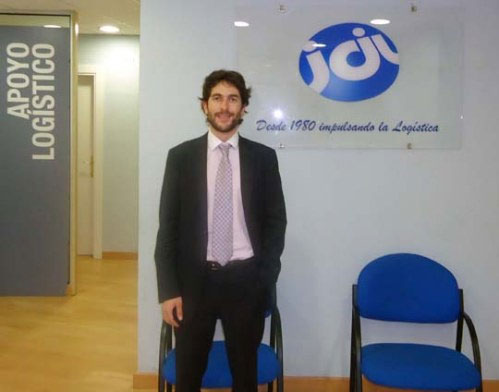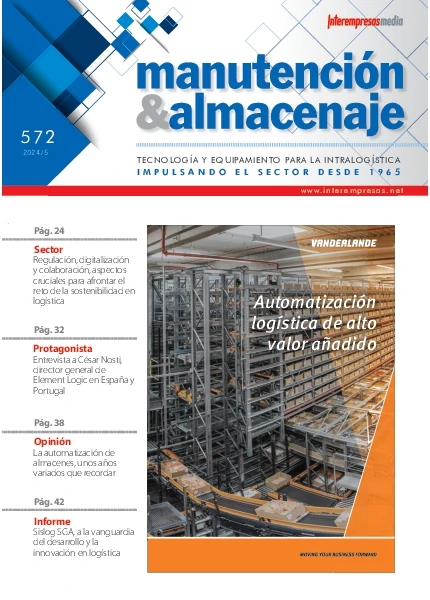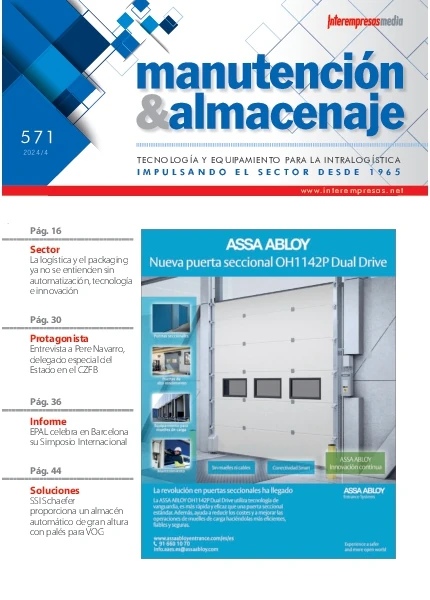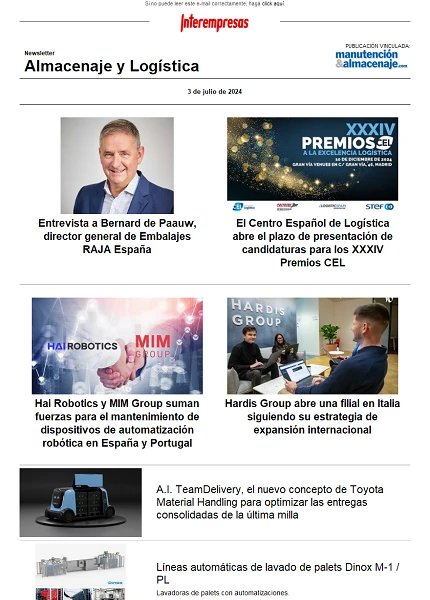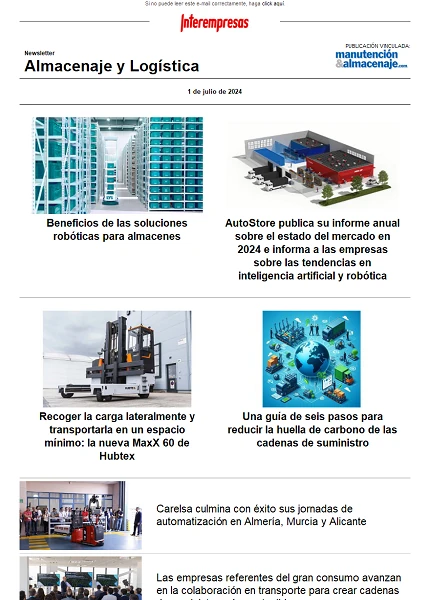The Foundation Icil participates actively in Logistics Madrid 2012
Likewise, the Foundation Icil took advantage of the surroundings of Logistics Madrid to llevar two presentations: on the one hand, the reverse ‘Logistical book in the gestión of the chain of supply', work written by Sunday Head and published by the publisher Marge that has been promoted and coordinated by the Foundations Icily Ecotic; and by another, the Technical Committee of Logistical Quality consultancy of the Foundation Icil presented ‘Principles of Logistical Quality consultancy', a document that seats the bases for the performance and the development of the best practices by part of the skilled consultancies in the field of the logistics and the supply chain, basing in concepts like the transparency, the collaboration, the loyal competition or the commitment of quality, among others.
Dynamic area ‘Showroom Icil': from the packaging until the reverse logistics in the chain of supply
Like novelty in this edition with regard to the one of 2011, the Foundation Icil organised in the frame of Logistics Madrid 2012 a dynamic area in which they llevar different demonstrations of the existent synergies between the container, the packaging, the logistics and the chain of supply. In 116 square metres of surface, a veintena of companies gave to know the potential of the equipment and material that manufacture (containers, packagings, carts, palés, shelves, printers, displays, retractiladoras, etc.) and his perfect adecuación to the exigencias of the logistical chains.
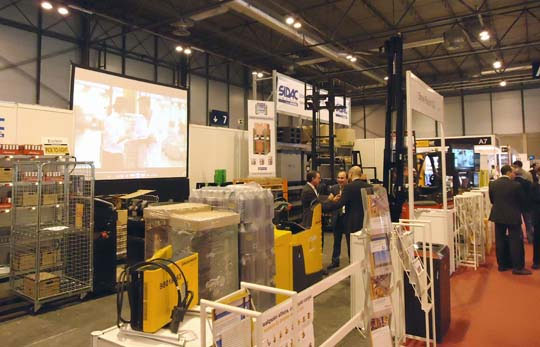
The companies that participated in the area of exhibition and that gave to know the capacities and provision of his products and equipment were: Nutrexpa, Group Mahou-San Miguel, AndSoft, Jungheinrich, Bergé Manutención CAT, Manitou, Sivart, Gesgrup (Group Constant), Chep, LYL Engineering, Carton packagings Font, Bepalet–Ribawood, Estyant, Labware, Telstar, Electrotec, Man Industries Teixidó, Cabka, Made4Net, Graphic Miscellaneous, Sidac Iberia and Ros Spain.
Logistics Madrid 2012 coincided with Empack Madrid 2012, a living room devoted to the packaging that shows the last innovations in technology of packs and packaging.
Under the lemma ‘From the packaging until the reverse logistics in the chain of supply: the implication of the packs and packaging in the trazabilidad of the products', in the dynamic area designed and built a gifted warehouse with: conventional shelves, systems of ERP, SGA and Gestión of routes, systems of tags and of bar codes (RFID, QR) for the control of the trazabilidad, sorters, stackers, carriers, strapping, systems of picking (from the traditional until pick-to-light), as well as different types of palés and containers and types of packagings.
Jaime Looks, technical director of the Foundation Icil, llevar the explanation of all the steps and processes in this demonstration of a chain of complete supply.
The demonstration served to see from beginning to end operations B2B between companies and B2C between companies and final customers, organising for this a physical circuit that included the physical processes of: reception, download and location in conventional shelving; the circuit of information (follow-up of the trazabilidad showed by bar codes, RFID, QR, ERP and SGA); the manufacturing of requests ‘pick to light'; and the three-dimensional control (weight and size).
To llevar these operations, the company Made4Net contributed his suite SCExpert, that allows the control and the gestión of the SGA, the station of load of containers, the gestión of the transport and optimisation of routes, the ‘delivery tracking' or proof of delivery, the ‘yard management' or gestión of the beach of trucks, the ‘praise planning' or optimisation of load and the turnover.
Through the platform NetLog of Made4Net showed the visibility in the chain of supply and the integration for a greater collaboration B2B between the organisation and the customers and providers. Likewise, Made4Net also contributed his WarehouseExpert, a complete system of gestión of warehouses.
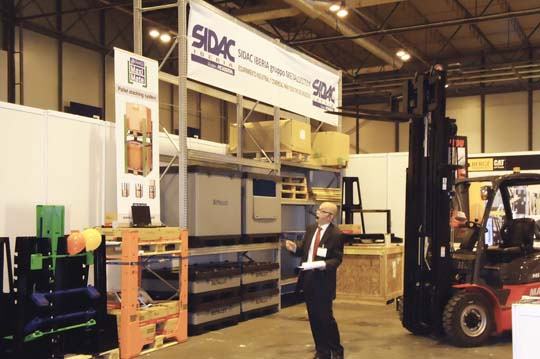
In the section of the packaging, Carton packagings Font gave to know his distinct models of containers, pallets and packagings, standing out between these the isothermal sensors, the reusable and the specific for the consumption.
Graphic Miscellaneous showed the distinct systems of labeling and the company Sivart the distinct modalities of labeling and identification, as well as the equipment of reading.
In the field of the storage, Sidac Iberia presented diverse models of dynamic shelves, whereas the company Ros Spain gave to know the systems for the protection of the shelves.
To finalise this block, Estyant showed one of his products, the apilador of palés.
To continuation gave step to the demonstration of how can manage the beach of trucks (Yard Management), by means of the control of the trucks that go in and go out of an installation, the automatic allocation of dock, the automatic process of ‘yard-to-dock and dock-to-yard', the follow-up in real time of the trailers, the gestión of the drivers in the beach of trucks, the storage, the complete visibility of the inventory and the analysis and presentation of reports.
Later realised the operations of gestión of location in shelving, presenting these in conventional and dynamic shelves and in shelves for picking. Also it did a demonstration of the operation of the intelligent containers instrumented with tags.
The following process llevar was the reception of the commodity. Through the system CubiScan of LYL Engineering, that allows to realise the control of the weight and of the volume (three-dimensional), managed the information on dimensions and weights for the optimisation of the reception and the control of the commodity and for an optimum back gestión of the location, gestión of requests and expeditions, panificación of loads and routes, optimisation of units of load and control of prices.
LYL Engineering also showed the MaxLoad Pro, a system that generates multiple solutions when the user selects several sizes of vehicle and of load, since, to way of example, an analysis of efficient load can diminish the costs of transport between 8% and 10%.
To continuation realised the demonstration of the system of Made4Net for the optimisation of loads (loading), that combined with the MaxLoad Pro of LYL Engineering for the expedition and delivery of loads.
This process was gone on down the one of the gestión of requests through Kanban and, immediately initiated the operations of location and replacement in different types of gaps in the linear for a back location of stocks and for picking. In this process used distinct types of palés, like the palé European, the ½ palé and the ¼ of palé. Also it gave to know the palé ISO (120 x 100 cm) of plastic designed and developed by Mahou–San Miguel for the pool of empty boxes.
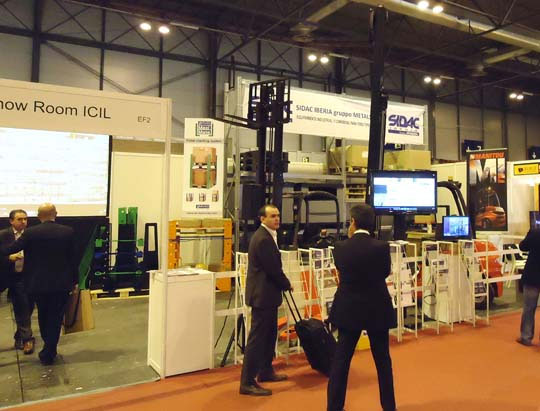
The companies Chep, BePallet and Cabka also exposed the advantages of his products, like the containers and pallets of Chep specifically designed for supermarkets, the systems of BePallet for the transport and the storage and his hygienic palettes, or the different palettes of plastic of Cabka that thanks to his little weight and functionality contribute to the reduction of costs and present advantages for the operations of export.
For the demonstration of the gestión of locations, realised the manipulation of requests with different heights and types of equipment of manutención, from apiladoras and collect-requests, until transpalés with platform elevadora. In this field used machinery of warehouse of Jungheinrich, Bergé–CAT and Manitou.
Simultaneously, llevar the processes associated to the gestión of requests, like the volume and weight of requests to prepare, the number of products by request, the global manufacturing by loaders (route of delivery), and the allocation of rubricas by request (urgent, fragile, textile, etc.). Also it realised the synchronisation of the stock for the gestión of the request.
To continuation gave step to the manufacturing of requests ‘pick to light' without papers and by means of displays, field in which the companies Labware, Electrotec and Telstar showed the systems that indicate where there is look for the product, integrated cheese cheese in shelves of Sidac-Iberia, realising the manufacturing of requests from the extraction equipment equipment in shelving.
The picking without papers by means of displays characterises by a high productivity and quality since the system guides to the operario to the location by means of a luminous pilot, the inventory is continuous, the regularisation of the stock in the location is instantaneous, delete errors and confusions of a product by another and obtains a trazabilidad automatic, between other advantages.
Likewise, proceeded to the demonstration of the processes of expedition and delivery through the platform of Made4net, with the consequent optimisation of loads, planning and follow-up of routes, gestión of fleets and planning and delivery of requests.
In this last appearance, the demonstration ran to charge of the company AndSoft that, through Smartphone and Tablet of confirmation of reception, managed the delivery of requests by part of the companies of transport. The tools of AndSoft allow the follow-up of the deliveries, with distinct levels and methods of confirmation of delivery, obtaining a trazabilidad and complete visibility, even in the stretch of the ‘last mile'.
Along all the demonstration organised by the Foundation ICIL, also had the participation of Man Industries Teixidó, that contributed to the distinct dynamic area products and equipments for the efficient gestión of the chain of supply, Gesgrup Outsourcing, devoted to the externalización of industrial processes and logistical services; and Ribawood that, between other activities, also devotes to the packaging, manufacturing packagings (boxes, pallets, trays) alternative and new.
Presentation of the ‘Principles of Logistical Quality consultancy'
The Sectorial Committee of Logistical Quality consultancy of the Foundation ICIL presented in the frame of Logistics Madrid 2012, the ‘Principles of the Logistical Quality consultancy', a document that seats the bases for the performance and the development of the best practices by part of the skilled consultancies in the field of the logistics and the supply chain, basing in concepts like the transparency, the collaboration, the loyal competition or the commitment of quality, among others.
In the presentation participated Joan Josep Vallvé (Logistalfa) manager of the Sectorial Committee of Logistical Quality consultancy, Sergi Lafita (Iteral), Matthias Kohlmay (Miebach Quality consultancy) and Antonio Churches (Logispyme).
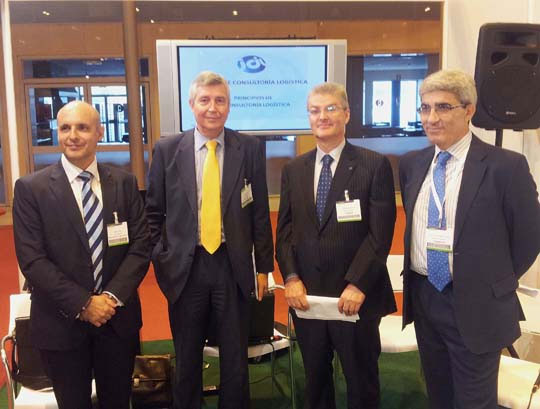
The ‘Principles of the Logistical Quality consultancy' comprise 10 points based in:
- Independence: the principle of independence guarantees that the only interest of the logistical quality consultancy is to advise to his customers on the best solution in accordance with his needs, defending in all the cases the interests of the customers in front of the providers of solutions and equipment, perceiving by these services a just contraprestación and that does not have any relation with the possible providers that will llevar the logistical solutions.
- Transparency, collaboration, transmission of knowledges and confidentiality: the relation with the customer has to be always transparent and colaborativa, working to his side so that both form part of the same team. The consultor also has to transmit the knowledge to contribute value further of the mere information. And the confidentiality between customer and consultor also has to be reciprocal
- loyal Competition: the logistical consultancies will develop his business activity inside the terms of the ethical competition, presenting to the customers proposed of competitive services and balanced in what price/quality. The commercial action of the logistical consultancies has to also develop in a frame escrupuloso of free competition.
- Develop and implantation of projects: in the development of a project, the logistical quality consultancy has to contribute the most adapted solutions to the needs of the customer, with independence of the supplier of the team, installation or service to implant. Besides, it has to offer his participation in a project from his start (development) to the end (implantation), giving a service of accompaniment so much in the process of set up, as in the one of follow-up and adjust logistical back.
- Methodology, experience and innovation contrasted: the logistical quality consultancy comports the application of different contrasted and solid methodologies that give answer to the needs of the customers. The consultancies have to be qualified to endorse his projects and works through a big experience in the logistical field of companies and institutions, as well as know the last logistical and technological solutions to apply them to the concrete situation of any company, contributing with this to the investigation and development of innovative logistical solutions.
- Commitment of technical quality with measurable results: the logistical consultancies have to look for the best solution to give answer to the needs and business aims of his customers. The clear-cut solution has to work for the purpose required and has to can measure once set# up to confirm that they obtain the results expected.
- Knowledge of the norms: the logistical quality consultancy has to know and integrate the norms of application to all the products or services that offer to a customer. Of previous form to the definition of any proposal, the logistical quality consultancy has to take into account the rule of valid application so much to general level as to local and specific level of the zone where situates the activity. The knowledge of this legislation has to consider any field that can have some repercussion in the constructive design, as well as in the operative processes to develop.
- Coverage of risks and responsibilities: the company of quality consultancy has to guarantee that it is to title of all those necessary permissions for the provision of the services that offers and that demands the valid legislation. Also it has to be abreast of the fulfillment of the obligations that have or can have in accordance with the copyright, the fiscal and labour legislations and the measures of planned hygiene in the Organic Law of Data protection of Personal Character. Likewise, the logistical quality consultancy has to know and fulfil with the environingingmental legislation and of gestión of waste that is him applicable in function of his activity. The quality consultancy has to have of a Safe of Civil Responsibility to guarantee the coverage of responsibility by material and personal damages caused to third like consequence of the development of his activity. And also it has to take consciousness of the Corporate Social Responsibility of the sector and value the repercussion of his services, contributing solutions that do more competitive to the economic fabric and to the territory.
- Complete solutions with clear-cut scope: to the start of the project the logistical quality consultancy has to define together with the customer the scope of the project, indicating clearly which points include or no from the start until the ending of the project. The commitment with the customer also includes the fulfillment of the terms established.
- Structures business solvent: the companies of logistical quality consultancy have to have a solvent and stable structure able to cover the needs of his customers or, in his defect, can contribute the necessary professional resources for the correct development of the projects. Also they have to be endowed of the sufficient financial resources to face the unforeseen that can arise and have of an organisational structure that give support to the project, being this developed with the minimum changes of resources and of managers by part of the quality consultancy.
In the actuality the Foundation Icil has constituted 10 Sectorial Committees, that group to 130 companies, in the sectors of: Feeding, Automotive sector, Logistical Operators, Textile, Logistical Equipment, Pharmaceutical Industry, Chemical Industry, Logistical Quality consultancy, Special Transports and Metallurgical Industry.
The Sectorial Committees Icil have consolidated like a forum of meeting and exchange of the logistical professionals, whose work contributes to the professional improvement, to the innovation in logistics and to the development of initiatives and logistical projects that they are of interest for the group of the sector.
Presented the reverse ‘Logistical book' of Sunday Head
Sunday Head, senior professor of the Foundation Icil, presented in the frame of the living room Logistics Madrid 2012, the reverse ‘Logistical book', a work that analyses the characteristics of the processes and products that constitute the returns, the returns, the mermas of process and the gestión of the products that are not sold or that arrive at the end of his useful life.
In the presentation of the book, Sunday Head was accompanied by Jaime Looks, technical director of the Foundation Icil.
According to the author, the publication, that has been promoted and coordinated by the Foundation Icil and the Foundation Ecotic and edited by the publisher Marge, incorporates economic theory focalizándola strictly in the reverse logistics. Besides, the work also has practical cases implemented in distinct fields and with a section devoted to the legislation, that is “very wide and very diverse”, according to Sunday Head.
For Domigo Head, the reverse logistics is distinct as in which organisation want to apply , since it does not go to be the same to manage returns that try reduce the environingingmental impact of a company. During the presentation, the author referred to the leadership that is taking the reverse logistics, especially in the field of the e-commerce and the on-line sales. Thus, for Sunday Head “the challenge more acuciante is that we are able to do of efficient form the on-line sale, because it is a sector that grows year after year in magnitudes of two digits. The suitable and effective gestión of the on-line sales goes through that the reverse logistics was a competitive advantage and no a problem”.
To finalise the presentation, Sunday Head referred to the reverse logistics like an element that, inside the chain of value, “allows to close the global cycle of an economic and environingingmental system”, adding that “integrate the reverse logistics in the processes of a company is already an advantage but inside some years, not to have it will be a problem and a competitive disadvantage”.
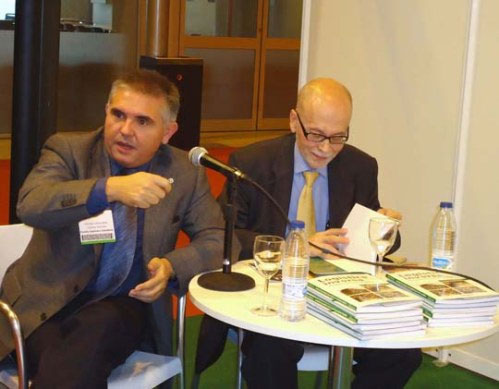
Read Six Sigma, a tool to transform the company
In the living room Logistics Madrid 2012, Javier Perales, Master Black Belt & Read Champion developed the practical workshop ‘Read Six Sigma the tool to transform our company'. Javier Perales split of the idea that “the knowledge creates the understanding”, although this do not mean that “go in in a methodology of improvement involve the apparition of complications because you put to convivir two or more ideas in some same surroundings”.
As it explained Javier Perales, “Read Six Sigma is a methodology because has tools, but is not a science because it is not exact and requires wit”. It treats rather of “a form to be, a way to the improvement that helps to the organisations to be more agile and faster, avoiding errors”.
The Read Six Sigma requires the sum of three fundamental appearances: leadership, to convince to a group of the way to visit and that the group creates is this way; culture, the habits, innate or learnt, that help to obtain a better behaviour of the group inside the organisation, especially of face to the customer; and tools, that are the steps to be followed to achieve improvements.
Besides, the Read Six Sigma has to conjuntar diverse factors or elements: the vision to where it is necessary to go, the skills with which can explain , the incentives that believe motivation and sense of belonging of the people, the resources (time, money, …) and the plans, that have to be clear; “the sum of these factors goes to propiciar the change inside the organisation”, ensured Javier Perales.
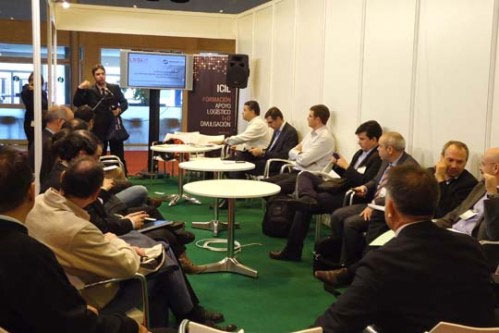
The expert in LSS also signalled that the organisations have to pose put that they are not fulfilling and, on these, define actions.
Exist mechanisms of action and methodologies of improvement that contribute to increase the productivity, that is to say, “do more with less”. These actions are, according to Javier Perales: the action to warn, the one of improvement and the one of control of the improvement that are those that go to allow combat the elements that prevent that an organisation was more productive. And to way of example quoted overloads it, when to the resources demands them more than what can do; the variability, since all the processes change constantly and generate difficulties to keep them controlled; and the scraps, like the overproduction, the defective, the excessive consumption of power or of transport. “All they represent costs, are difficult to identify and do not add value to the organisation”.
Javier Perales defined the Read like “a philosophy of administration of an organisation that does in team inside the company to avoid scraps”, and the Six Sigma like “a philosophy of businesses, with a methodology to reduce the variation and based in: define, measure, analyse, implement and control to solve problems”.
To finalise Javier Perales indicated the results that can obtain if it applies in Read Six Sigma in an organisation: “be a more competitive company, find opportunities of business, achieve a profitability sustained when attaining improve the costs, work in team in the organisation and have a strength of work highly trained”.
‘Further of the gestión of the stock: I do not sell because I do not have or I do not have because I do not sell'
During the living room Logistics Madrid 2012, Josep Safe, senior professor of the Foundation Icil developed in the Classroom Icil the report ‘Further of the gestión of the stock: I do not sell because I do not have or I do not have because I do not sell'.
Josep Safe initiated his class on the gestión of stocks indicating that give service is “the probability to supply complete a request, inside the agreed time, with products of a level of quality that exceed the perception of our customer without incidences neither in the delivery neither in information and documentation associated to this”. Thus, “before putting us to design a system of supply, have to be able of pactar with the commercial steering of the company to know exactly what goes to need the process of delivery”.
Josep Safe did for this a comparison of the production and the procurement with a high inventory and with a low inventory, showing that the cycles of production are directly proportional to the inventories in course.
For the professor of the Foundation Icil, like “having stock is to have capital inmovilizado”, before have to ask us which is the degree of service that have to give?, which composition has to have my portfolio?, and if I do not sell it because I do not have it or I do not have it because I do not sell it?
To reach the answers to these questions, Josep safe explained that it is necessary to fix carefully in the inventories for, between other things, achieve determine the number of times that the half inventory is sold to the year and the cost of maintenance of the inventory, that is to say, what costs to keep the stock (costs of opportunity, maintenance, obsolescences…).
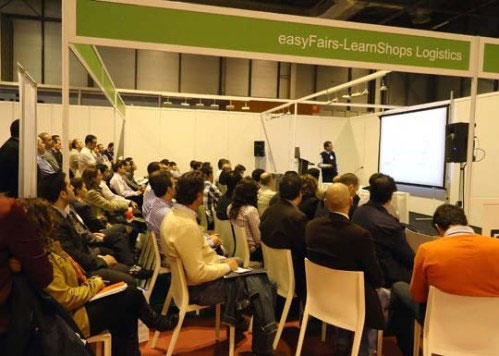
Safe also referred to the calculation of the stock of hygiene, which depends on the variability of the demand, of the time of procurement and of the frequency of the orders, and explained that it can calculate or minimising the total cost of the stock (the cost of possession, the one of request, the one of break and the one of acquisition), or establishing a level of service, that can achieve through a system SAP, that facilitates the calculation and acotación of the list of needs, the planning, the sizes of batch, the terms, and the stock of hygiene, among others.
Likewise, also have to ask us if all the articles of the portfolio have to receive the same level of stock of hygiene and if all the customers have to receive the same degree of service to arrive to the final conclusion of if “I do not have it because I do not sell it or do not sell it because I do not have it”.
To finalise his exhibition, Josep safe staged with an example the subject of his exhibition, speaking of the case of a company distributor of cosmetic with 26.000 articles in stock and near of 24 million euros in inventories. This company characterised by a cycle of slow replacement, a loss of visibility in the approach of the sales and some difficulties of negotiation with providers. From here it proceeded to the analysis of the situation of the stocks and of the inventory in obsolescences, in new articles and in the rest of references, that were 22.500.
The result of this analysis was the discover that a total of 1.900 articles (8,44% of the total), accumulated 80% of the sales and that a total of 6.900 articles (30,44%) accumulated the 98,6 % of the sales.
In front of these results, the company ask if it was recommended to delete the rest of articles of the portfolio and adjust his sales. The final proposal was to conserve the 3.100 references that practically contributed until the 100 % of the sales and that they were the articles that attracted service, whereas the rest of articles of the portfolio marked as no aprovisionables, designing for this a plan for saldarlos the before possible.
Like conclusion, Josep Safe signalled that, in the first place, it is necessary to understand the process for, to continuation apply reasonably the tools in plough to achieve do visible the data, transforming them in information to all the levels of the organisation that are necessary (participacion & empowerment). Only after the analysis is when it is necessary to apply the systems of information to avoid the mechanise the chaos. And for this is fundamental the learning and update of knowledges, share experiences and information and participate in the suitable forums.
The reverse logistics like source of business in the companies
Sunday Head, senior professor Foundation Icil, developed the report ‘The reverse logistics like source of business in the companies', during the celebration of Logistics. Along his exhibition, Sunday Head explained that the reverse logistics is similar to the direct logistics, that looks for to change organisation by money, but with a factor diferenciador: the reverse logistics search “change money by more money” to través, for example, of sales that have not materialised or to improve the account of results”.
For the professor of the Foundation Icil, “the reverse logistics takes advantage of basically the activities of collected, reuse, desmontaje, remanufactura of products used and his components with the aim of maximizar the aprovechamiento of his value, in the wide sense, and of his sustainability before his destruction”, that is to say, obtain a “maximisation of the value, lengthening the cycle of life of the products and converting what before were costs in income”.
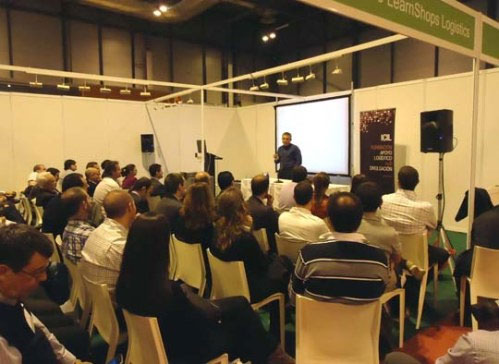
With regard to the main characteristic of the reverse logistics, Sunday Head explained that this can follow six different ways:
- From the customer or final consumer to the warehouses of distribution (collected of returns or defective products).
- Repair of products.
- catering in factory, no in company externalizada.
- Destruction and aprovechamiento of components for his use in the manufacture of other products.
- Gestión of waste and recycling.
- Incineration and destruction for production of electrical power, for example.
For the professor of the Foundation Icil, in reverse logistics “do not exist processes like the estimate of sales or the planning of demand”. For this reason, in sectors like the one of the consumption, the fashion or others, in which it accustoms to have a lot of returns and mermas, “it is necessary to use the reverse logistics like competitive advantage in front of the competitors”. The manufacturers have to think in using this logistical discipline to lengthen the life of the products”. And like this they are it doing some, as they show it some advertising campaigns of known marks that ensure that they invest in actions to contaminate less or reduce the footprint of carbon, “achieving through the reverse logistics increase the confidence of the consumer”.
Sunday Head also referred to the reverse logistics to achieve reduce costs, alleging that apply the 3R is a way to achieve it and quoted like example the reduction of production of susceptible objects to turn into waste, the reuse of products through the manufactura to be able to increase the cycle of life and the recycling of materials and components.
With regard to the properly said costs, Sunday Head spoke of the”invisible costs that can save through the reverse logistics”, like the linked “to the space devoted to products that expect to sell, but that do not sell; the cost of the transport of the returns to the warehouse or the one of the deliveries to companies that have externalizado; the associated to the gestión of the products, especially those that do not sell ; the costs in stocks and his financials or the costs of manipulation”.
According to Sunday Head, the reverse logistics also can be an engine of sales, since “it can contribute to create new niches of market in which sell to some better prices those products that have not been sold and that already are or fashionable pasts or near to his date of caducity. “It treats to go back to sell before having a return”.
Finally, Sunday Head referred to the integration of the reverse logistics in the chain of value of the companies, ensuring that “it is necessary to arrive to the market before that the competition, maximizando the profitability, diminishing the capital through the decrease of warehouses and stocks, or selling by other channels that that has not sold by the traditional and, even, recovers investment through the recovery of materials or the recycling of products”.
For the expert in reverse logistics, in this also “is necessary to share the information with customers and providers because this goes us to help to have confidence and collaboration in the supply chain management”.
Daniel Rey Fernández, of Chep, winner of the scholarship of the Foundation Icil
During the celebration of the living room Logistics Madrid 2012, the Foundation Icil sorteó a scholarship for cursar a máster of which develops the entity and that is valued in 8.800 euros.
The winner was Daniel Rey Fernández, of the company Chep, that cursará the Master Supply Chain Management that develops the entity. The draw effected from among all the papeletas deposited in the stand of the Foundation Icil along the two days of the contest.
